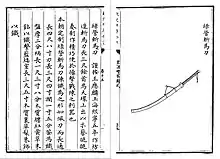| Zhanmadao (斬馬刀) | |
|---|---|
 A zhanmadao "horse butchering dao" from a Qing dynasty illustration, 1766 | |
| Type | Infantry anti-cavalry saber |
| Place of origin | Han dynasty, China |
| Production history | |
| Variants | Possible changdao, miaodao, wodao, zanbatō |
| Specifications | |
| Length | Approx 200 cm (79 in)+ |
| Blade length | Approx 150 cm (59 in)+ |
| Blade type | Single edged, straight for most of the length, curving in the last third. |
| Hilt type | Two handed |
The zhanmadao (Chinese: 斬馬刀; pinyin: zhǎnmǎdāo; lit. 'horse chopping saber') was a single-bladed anti-cavalry Chinese sword. It originated during the Han dynasty (206 BC – 220 AD) and was especially common in Song China (960–1279).
General characteristics
The zhanmadao is a single-edged sabre with a long broad blade, and a long handle suitable for two-handed use. It was used as an anti-cavalry weapon, dating from Emperor Cheng of Han, made to slice through a horse's legs.[1] This is mentioned in the Wujing Zongyao, a Song Military Manual from 1072.[2] It featured prominently against the Jin armies in campaigns between 1129 and 1141.[3]
The earliest variant of the zhanmadao is called zhanmajian (pinyin: Zhǎn mǎ jiàn), literally "horse beheading jian". Zhanmajian existed during the Han dynasty, so called because it was supposedly able to cut off a horse's head.[4] The difference between the two is that zhanmajian is double-edged whereas the zhanmadao is single-edged, which persists with the meaning of jian and dao. Another suggestion is that the zhanmajian was an execution tool used on special occasions rather than a military weapon.[5]
Surviving examples include a sword that might resemble a nagamaki in construction; it had a wrapped handle 37 cm (15 in) long making it easy to grip with two hands with a blade that was 114 cm (45 in) long with straight, with a slight curve in the last half.[6]
Similar weapons
Possible variations of these Chinese swords were the changdao of Tang dynasty and Ming dynasty, wodao of Qing dynasty, as well as miaodao of the Republican Era. The zhanmadao may have also been the inspiration for the Japanese zanbatō (斬馬刀); both are written with the same characters and have been said to have been used for killing the horse and rider in one swing.[7]
See also
References
- ↑ Yang, Jwing-Ming (1 March 1999). Ancient Chinese Weapons: A Martial Artist's Guide. YMAA Publication Center Inc. p. 65. ISBN 978-1-886969-67-4. Retrieved 27 January 2013.
- ↑ "The Mongol Siege of Xiangyang and Fan-ch'eng and the Song military". deremilitari.org. Retrieved 6 November 2010.
- ↑ Scott, Richard Bodley; Gaukroger, Nik (22 September 2009). Empires of the Dragon: The Far East at War. Osprey Publishing. p. 107. ISBN 978-1-84603-690-3. Retrieved 27 January 2013.
- ↑ Lorge 2011, p. 103.
- ↑ Zhan Ma Dao (斬馬刀), 7 April 2015, retrieved 15 April 2018
- ↑ Jarymowycz, Roman Johann (2008). Cavalry from Hoof to Track. Greenwood Publishing Group. p. 31. ISBN 978-0-275-98726-8.
- ↑ Breverton, Terry (26 April 2012). Breverton's Encyclopedia of Inventions: A Compendium of Technological Leaps, Groundbreaking Discoveries and Scientific Breakthroughs that Changed the World. Quercus Publishing. p. 18. ISBN 978-1-78087-340-4. Retrieved 27 January 2013.
Bibliography
- Lorge, Peter A. (2011), Chinese Martial Arts: From Antiquity to the Twenty-First Century, Cambridge: Cambridge University Press, ISBN 978-0-521-87881-4